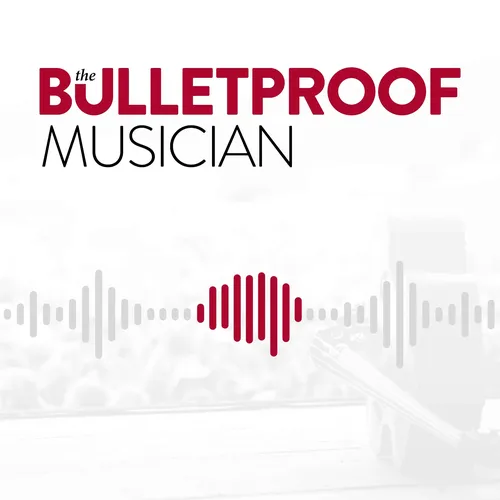
The Bulletproof Musician
Ever wonder why you can practice for hours, sound great in the practice room, and still be frustratingly hit or miss on stage? Join performance psychologist and Juilliard alumnus/faculty Noa Kageyama, and explore research-based “practice hacks” for beating anxiety, practicing more effectively, and playing up to your full abilities when it matters most.
- Update frequency
- every 7 days
- Average duration
- 17 minutes
- Episodes
- 394
- Years Active
- 2018 - 2025

Why Highly “Representative” Practice Is so Important (Except When It Isn’t)
The idea of "performance practice," and preparing for the unique demands of performances makes a lot of intuitive sense - but are there times when this is NOT the most useful way to practice?

Change This One Word to Get More Useful Feedback From Peers and Colleagues
Both giving and receiving feedback can be tricky (and icky). And if you've found feedback you've received to be kind of vague or otherwise unhelpful, research suggests that a tiny change to the langu…

Can Young Students Be Taught to Engage in Deliberate Practice Too?
Deliberate or "deep" practice is widely acknowledged to be a critical factor in cultivating talent and ability. But at what age is this something that can be learned? Is this something that middle-sc…

Angela Beeching: On the Keys to Developing a Career That’s Totally “You”
Ever freak out about what exactly you're going to do when you finish school, and how you're going to get there? Or maybe you're on the other side of school, but struggling a bit to find your unique v…

Quirky Pre-Performance Rituals: Do They Really Work?
Many athletes and musicians engage in quirky rituals before each show. Do these really work? And if so, why?
Quirky Pre-Performance Rituals: Do They Really Work?
More from The Bulletproof Musician

Get into a Better Pre-Audition Headspace with a "Heroic" Playlist
Staying in a good headspace when you have a lot of time to kill before a concert or audition can be a real challenge. But research suggests that listening to a particular kind of music could help.

Why the “Task Completion Bias” Could Give You the Illusion of Productive Practice, but Make You Less Productive in the Long-Term
Is it more productive to front-load easy problems or to work on difficult ones? Well, research suggests that working on easy problems can be deceptively productive (and satisfying!) in the short term…

A Simple Technique That Could Help You Give Better Advice to Your Students
There's a legitimate reason (the "curse of expertise") why it can sometimes be difficult for experts to teach less experienced players how to learn skills that the expert has long ago encoded into th…

Claire Stefani: On Chinrests, Shoulder Rests, and How the Right Setup Can Facilitate More Effortless, Tension-free Playing
High chinrest? Low chinrest? Centered? Shoulder rest? Shoulder pad/sponge? Or no shoulder rest at all? Finding the right setup can feel like a bewildering process of blind trial and error. But as Cla…

How to Use Positive “Trigger Words” for More Expressive Performances
Research suggests that positive "trigger words" can help you get into character more effectively, and facilitate more expressive performances.

The “Gesturing Effect": A Way to Learn New Skills More Quickly?
Need to get a new piece learned faster? Here's a study which suggests we might be able to give ourselves a head start by gesturing while watching a video (like air guitar).

How Many of Our Worries Actually Come True?
I once read a claim that 90% of the things we worry about never come true. But is this true? Or is it one of those made-up stats like how 73.6% of all statistics are made up?

Blaise Dejardin: On Emotion, Technique, and the Kind of Practice That Facilitates Consistently Beautiful Performances
Boston Symphony Principal Cello Blaise Déjardin shares insights on how he practices for consistently beautiful performances, and what he did to get into a good headspace on the day of his audition.

Your “Stress Mindset,” and How This Could Make Stress Work For or Against You
Emerging research suggests that our "stress mindset" influences our physical, mental, and emotional response to stress - and whether it has a positive or negative effect.

Why Day-of-Performance Butterflies May Actually Be a Good Thing
Have you ever wished there were a way to make performance days feel more like normal days and not have to deal with the butterflies? Well, research suggests that you may want to rethink this particul…

"Action Observation," And How to Get More out of Your Mental Imagery Practice
Turns out mental imagery has a much bigger effect on learning and performance if you are good at imagery. So what are your options if imagery is something that you struggle with?

Tom Hooten: On Being Curious, and Elevating Learning and Growth Above Ego
Hear LA Phil Principal Trumpet Tom Hooten describe the uncommon mindset and approach to learning that has helped him become the player he is today.

How to "Reset" Your Body Clock and Shift Your Peak Performance Window (& Thrive in AM Rehearsals)
Are you a "night owl" that struggles with sluggishness in morning rehearsals or practice sessions? A recent study suggests that you can actually become more of a morning person and be more effective …

Are Coffee Naps Legit?
Have you ever heard of a coffee nap? It's exactly what it sounds like - but is there any research supporting such a thing? Actually, yes! A few studies have looked at whether a coffee nap is better t…

The Role of Self-Compassion in Overcoming Setbacks and Cultivating Mental Toughness
Setbacks are inevitable, and there may not be much we can do to prevent them - but we do have control over how we respond. A recent study illustrates how formerly excessively self-critical athletes h…